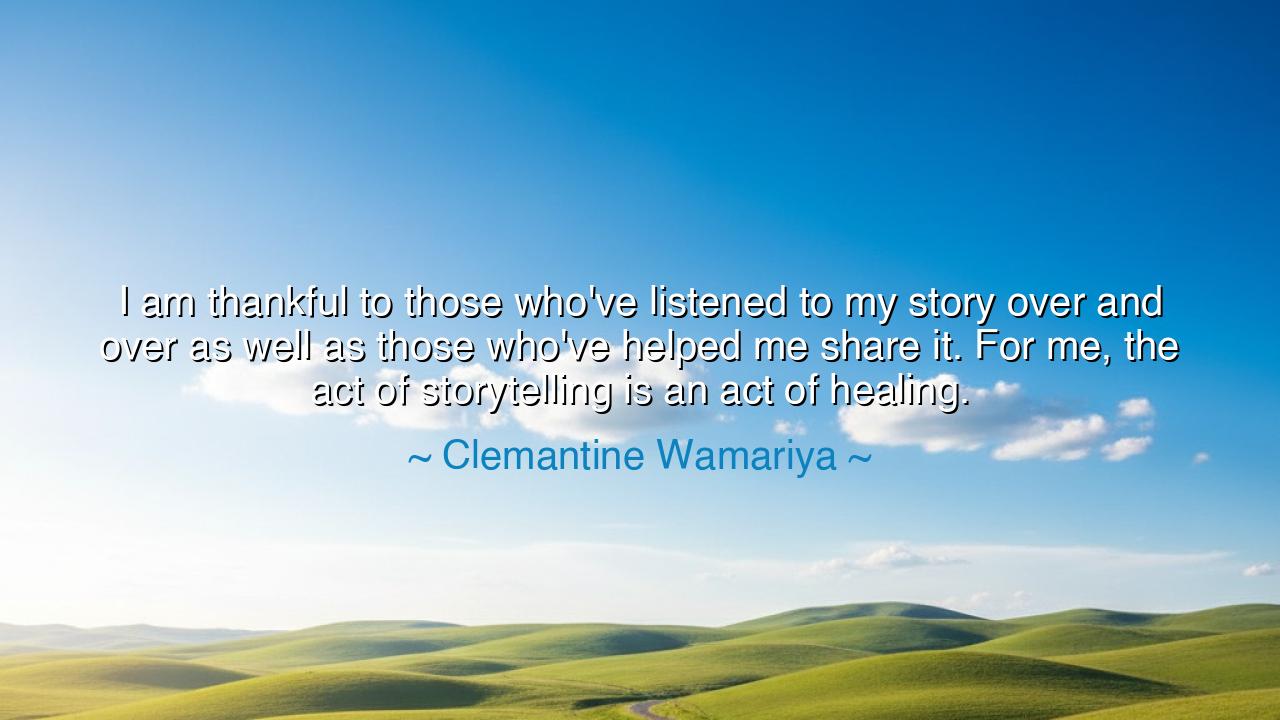
I am thankful to those who've listened to my story over and over
I am thankful to those who've listened to my story over and over as well as those who've helped me share it. For me, the act of storytelling is an act of healing.






The words of Clemantine Wamariya, survivor of war, seeker of peace, and bearer of memory, echo with the power of resilience: “I am thankful to those who've listened to my story over and over as well as those who've helped me share it. For me, the act of storytelling is an act of healing.” In these words lies the ancient truth that stories are not only vessels of history, but medicines for the wounded soul. They bind together the teller and the listener, turning private pain into shared understanding, and from that shared understanding, a measure of wholeness is born.
To be thankful to those who listen is to acknowledge the courage it takes to bear witness. For in listening deeply, one does not simply hear words, but enters into another’s suffering, holding space for truths that may be heavy, harrowing, or raw. Wamariya, a survivor of the Rwandan genocide, knows that her story is not light, nor easily repeated, yet each time it is received, the burden becomes a little less crushing. In this, we see that healing is not a solitary act, but a communal one—healing requires witnesses willing to stand in the shadow with you.
The ancients understood this power of storytelling. The Greeks told tragedies not merely to entertain, but to cleanse, to draw catharsis from shared suffering. The Hebrew psalms gave voice to lament, transforming anguish into prayer. The griots of Africa preserved the struggles and triumphs of their people in song, ensuring that pain was never endured in silence but woven into the fabric of communal memory. Wamariya, by telling her own story, continues this sacred lineage, where words do not merely recount events but sanctify them, transforming wounds into wisdom.
Her recognition that storytelling is an act of healing reveals another layer of truth: in speaking, one reclaims power over what was once a source of powerlessness. Trauma silences; it isolates, making one a prisoner of unspeakable memory. Yet when the story is told, the chains are broken. The horrors are named, the silence is shattered, and the storyteller becomes sovereign over their own narrative. Wamariya’s gratitude is therefore not only for her listeners, but for her own ability to transform suffering into speech, and speech into strength.
History offers many examples of this truth. Consider Elie Wiesel, survivor of the Holocaust, who bore his testimony in Night, ensuring that the memory of those who perished would not vanish into darkness. In telling his story, he healed not only himself but also the world, reminding humanity of its duty to remember. Or recall the songs of enslaved peoples in America, whose spirituals carried both grief and hope, binding the broken into a fellowship of survival. In each case, the act of storytelling became both survival and medicine, much as Wamariya describes.
Her words carry a quiet heroism, for it is no small thing to tell the same story “over and over.” To repeat is to reopen, to relive, to risk the pain again. Yet Wamariya is thankful, because she knows that each telling is also a step in healing, and each listener becomes part of her restoration. It is a cycle of courage and compassion: she offers her vulnerability, and the world answers with witness. In this exchange, something holy occurs—the wounds of the past begin to close, and the future opens wider.
The lesson for us is clear: never underestimate the power of a story, whether your own or another’s. If you have endured suffering, tell your story, and let it become your path to healing. If you are privileged to listen, do so with reverence, for listening is itself an act of love. Be thankful for the chance to share, and be thankful for the chance to bear witness. For in this exchange, pain is transformed, hearts are knit together, and healing flows not to one but to all.
Therefore, let us act. Share your truths, however small or heavy, and in doing so release their hold upon you. Listen to others with patience and compassion, offering them the sanctuary of your attention. And above all, remember the wisdom of Clemantine Wamariya: that the telling of a story is not weakness, but strength; not despair, but rebirth. For every story told in gratitude becomes a bridge across the abyss of suffering, carrying us closer to healing, wholeness, and hope.






AAdministratorAdministrator
Welcome, honored guests. Please leave a comment, we will respond soon